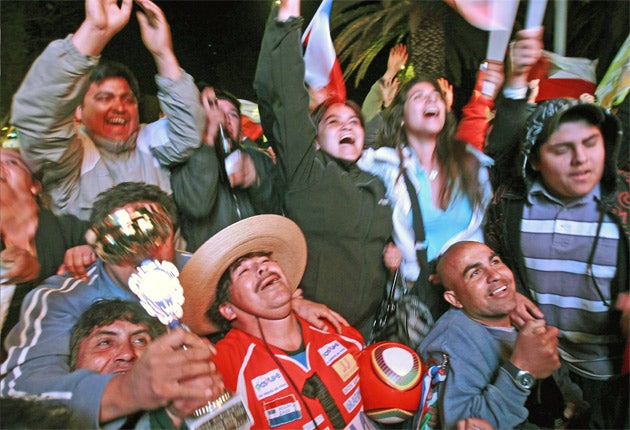The whole world watched, but a nation has been transformed
Rescue that thrilled global audience has unified Chile in a new spirit of optimism

Your support helps us to tell the story
From reproductive rights to climate change to Big Tech, The Independent is on the ground when the story is developing. Whether it's investigating the financials of Elon Musk's pro-Trump PAC or producing our latest documentary, 'The A Word', which shines a light on the American women fighting for reproductive rights, we know how important it is to parse out the facts from the messaging.
At such a critical moment in US history, we need reporters on the ground. Your donation allows us to keep sending journalists to speak to both sides of the story.
The Independent is trusted by Americans across the entire political spectrum. And unlike many other quality news outlets, we choose not to lock Americans out of our reporting and analysis with paywalls. We believe quality journalism should be available to everyone, paid for by those who can afford it.
Your support makes all the difference.All across Santiago yesterday Chileans were on tenterhooks as they watched their compatriots winched to safety. The city is on the verge of the mother of all street parties but no one wants to celebrate just yet. Not until the last miner is safe.
"It'll be like a football match," predicted Sebastian Catalan, one of thousands of Chileans who last took part in a spontaneous street party in the capital's Plaza Italia when the trapped miners were discovered alive two months ago. That party, Mr Catalan explained, would be dwarfed by the celebration Santiago's residents were planning when the final miner was pulled from the ground.
"People have horns, grenades and drums, everyone's over the moon, making as much noise as possible, and all the cars are beeping," he said.
As the sun rose over the city yesterday morning, the daily commute into work was deceptively normal. But televisions in every shop window and radios in all the passing cars were tuned in to the rescue effort.
"Right now people are just working and waiting for the last person," said José Dumenes, a 52-year-old fruit seller from Recoleta. "Everyone's thinking about it. I was up till 3am last night watching it with my family and then here to set up at 6. That doesn't leave much room for sleep."
As workers made their way to their offices off Santiago's central pedestrianised street Ahumada, they filed past a large group of people fixated by a giant screen normally reserved for evening football matches. The screen showed Alex Vega, the 10th miner to be rescued, emerge into the sunlight after 70 days trapped underground. No one gasped or applauded, they just stood there transfixed.
No corner of the globe, meanwhile, was immune from the suspense and emotion created by the Chilean rescue. Among those who were rapt at the events were Chileans living in other countries, and mine workers on different continents who felt an instant bond of solidarity with those being brought back to the surface.
"Mainly we are proud of how the Chilean miners endured. From the first day through to the end, they behaved like true miners," said Elias Saguillo, 45, one of about 50 miners in Spain who recently staged a month-long underground protest over wages and work conditions. He and his colleagues have watched the developments in Chile since the drama started.
"I feel myself also there. It's like hope," said Francisco Castro, who was watching the action at the Quebec Chilean Association, in Montreal, a city that has a community of 10,000 Chileans. In Canada, the rescue was shown live over periods of hours by cable television. Globally, the BBC, CNN and Al Jazeera were among networks offering non-stop coverage of events at the mine.
Meanwhile, the web traffic monitoring company Akamai said it had seen a 20 per jump in activity globally which it attributed to people watching the rescue streamed via the internet. Other news events that have shown similar spikes recently have included the World Cup and the safe landing of a US Airways jet on the Hudson River. Political and religious leaders meanwhile paid tribute to Chile. Pope Benedict XVI offered prayers in the Vatican. Germany's Foreign Minister, Guido Westerwelle, also rejoiced. "What's happening here is a little modern miracle," he said. "I would like to express my respect for the Chilean government and also the Chilean people, who are now celebrating in joy".
In Plaza Italia, the atmosphere of expectation was palpable. Crowds of young locals swarmed the square waving giant Chilean flags while lost-looking old men stuck to the fringes weeping into their hats and pampering effigies of the Virgin Mary.
When President Pinera returns from his visit to Europe on the 15th, the 33 miners will be treated to the kind of national celebration usually reserved for World Cup winners.
For the meantime, police lining the streets have nothing to do other than watch. Much as they might like to harness the energy behind this outpouring of national emotion, the Government know there is little they will be able to do once the street parties begin.
"It's something that we can't control," said Aileen Carcamo Bruning, a government worker from La Moneda. "It's something spontaneous – people just go for it and we never know what's going to happen."
Join our commenting forum
Join thought-provoking conversations, follow other Independent readers and see their replies
Comments